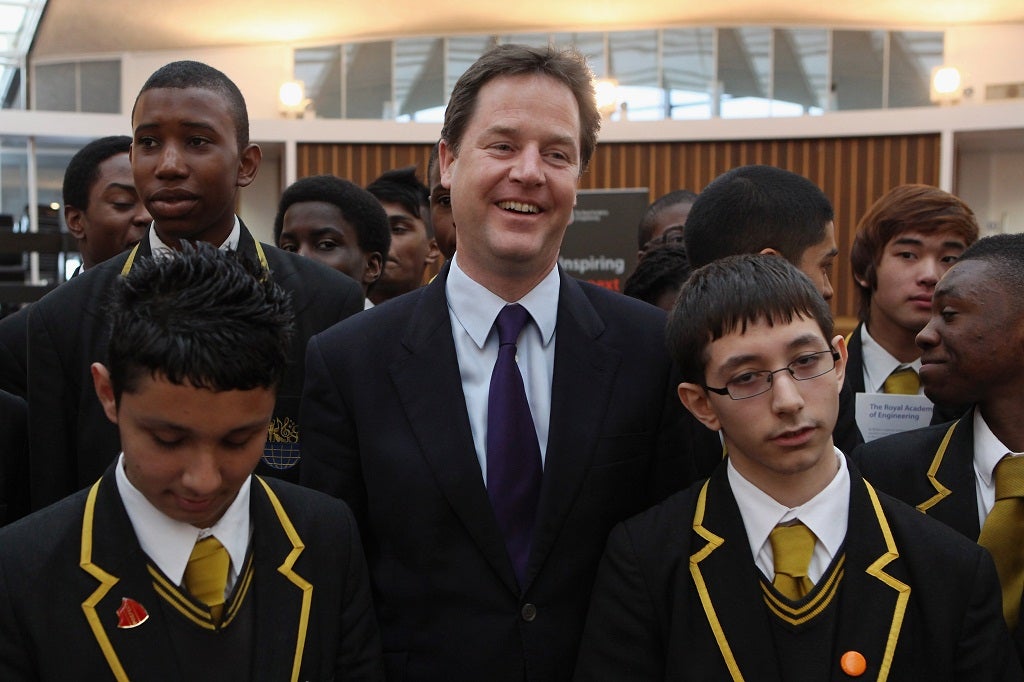The coalition's social mobility strategy took another turn today with Nick Clegg's trailed announcement that a further £50 million will be spent on catch-up tuition for children who have not reached level four in their Key Stage Two exams at the end of primary school.
This focus on pupils who need to ‘catch-up’ is already adopted by many successful schools in England. These schools explicitly target pupils requiring rapid catch-up tuition in their first year at secondary school by placing them in small groups with special teaching-techniques focused on literacy and numeracy until they reach the average level of performance for their age group.
The attention given to children who are identified as having ‘learning needs’ is also a key feature of Finland’s success in international education rankings, and it is premised on the idea that individual pupils who are struggling need to be identified early and given appropriate support to improve.
This is done by supplementing their mainstream schooling with part-time small group tuition, provided by a special education teacher. The teachers are highly trained and give pupils an individual learning plan to help them reach the required level. The stigma of attending these classes is reduced by the sheer volume of students taking part – at least one-third of pupils are enrolled at any one time, and nearly half of pupils receive some form of catch-up tuition over the course of their school career. As a result of this approach, inequalities of attainment within Finnish schools are lower than in most OECD countries.
So this is a very welcome move. But it also highlights two mistakes made early on by the coalition government.
First, it at least partially reverses the decision to scrap Labour's commitment to specialist one-to-one tuition for all children who have fallen behind by the time they reach secondary school, which was due to be rolled out in 2011. And it highlights the folly of cutting ring-fenced funding for the successful Every Child a Reader and Every Child Counts programmes which funded specialist teachers to provide intensive support to pupils at Key Stage 1.
These programmes were cut despite glowing evaluations as to their success: at the end of Year 1, the reading recovery programmes supported by Every Child a Reader increased the numbers of children reaching level 1 or above in their reading by 26 percentage points. It also markedly increased children's enjoyment of reading, with many more taking books home from school.
Second, the fact that the Government is rolling out extra funding for catch up highlights the fact that schools are not spending the new pupil premium money on such proven programmes targeted at those who have fallen behind. The Institute for Public Policy Research made this case as far back as 2010 and Ofsted has now confirmed that the money is not being well used by schools. We need this money to be focused on providing focused catch up in numeracy and literacy to all children who need it, rather than simply plugging holes in school budgets. The Government should have provided children with a catch up entitlement so that schools are focusing the extra money on the children for whom it is intended.
A recent IPPR report argued that it is perfectly possibly to reduce educational inequalities in England if we ensure that resource is focused on quality programmes that we know work. This means doing more than tackling failing schools, although that is important: if all pupils attended an outstanding school then the gap at GCSE between richer and poorer children would fall by just 20 percent. This is because even when poorer children are in good schools they still lag behind their better off class mates. To tackle this requires targeted interventions aimed specifically at those children. We estimate that the most effective interventions in primary and secondary schools, such as small group tuition and peer tutoring, could halve the gap between the richest and poorest students if they were implemented effectively. If supplemented by quality early years provision we could do even better.
Rick Muir is Associate Director at IPPR. IPPR’s recent report - A Long Division. Closing the attainment gap in England’s secondary schools - is available here.


Join our commenting forum
Join thought-provoking conversations, follow other Independent readers and see their replies